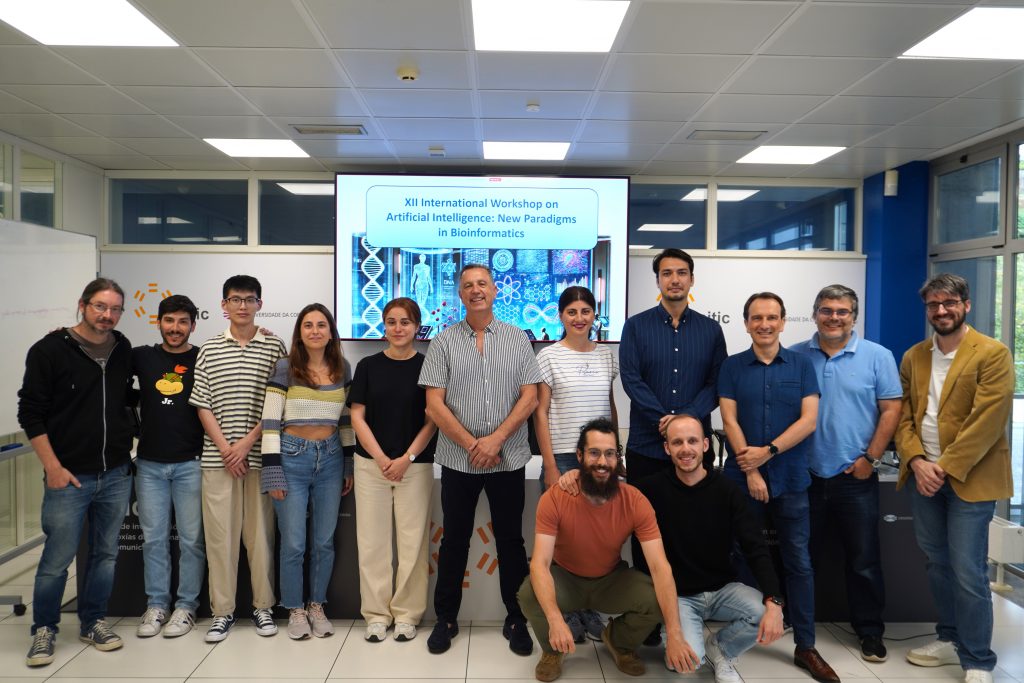
International AI meeting at UDC to establish biomedical research collaborations
- More than 30 speakers from 9 countries seek possible alliances for R&D&I projects at the workshop organized jointly by the CITIC, Biofarma and Ikerdata on July 9th.
- The researcher Alejandro Pazos presents “RISKEXPO”, a proposal that aims to identify molecules that can pass from packaging to food and their incidence in pathologies such as gastrointestinal diseases and colorectal cancer.
- Advanced prediction models applied to drug development or the presentation of the “cell painting” technique of the Biopharma group of CiMUS were other topics covered in this workshop.
A Coruña, July 9, 2024.- A working day brought together 30 speakers from 9 countries at the XII International Workshop on Artificial Intelligence: New Paradigms in Biomedical Informatics, organized by CITIC, UDC, RNASA-IMEDIR, Biofarma and IKERDATA. This event, which takes place simultaneously at UDC, USC and UPV, seeks to establish possible collaborations for future joint R&D&I projects.
The workshop focused on the application of artificial intelligence techniques and procedures in various aspects related to bioinformatics. Topics covered included the identification of biomarkers, indicators of the presence of certain etiopathogenic alterations, the search for drug candidates based on target molecules and environmental conditions, applications in different pathologies, as well as the use of AI and computation in various environments, bio-inspired models and security in data acquisition and management. In total, 17 conferences were held during the morning session at CITIC, and 4 workshops were held at the Faculty of Computer Sciences of the UDC.
In the presentation about the RISKEXPO project, CITIC researchers Alejandro Pazos and Natia Tamarashvili explained the development of a project to present in a call of the EU or NIH (National Institutes of Health, USA) related to gastrointestinal disease and colorectal cancer. The starting hypothesis is that diet and the materials used for food preservation may influence the development of gastrointestinal diseases, including colorectal cancer. The researchers’ proposal seeks to identify molecules that can be transferred from packaging to food and that are responsible for these pathologies, to propose regulations to the competent authorities.
On its turn, the USC Biopharma group spoke about an innovative technique used in drug development called “cell painting”. This method uses cell staining and image analysis to evaluate the effects of chemical compounds on cells, allowing early prediction of the therapeutic and toxic effects of drug candidates. The basic principles, advantages and application examples were discussed, as well as the challenges and future perspectives of this technique in pharmaceutical research.
The group of researchers from IKERDATA-UPV/EHU also focused their intervention on advanced prediction models applied to drug development. These models allow predicting drug delivery through nanosystems, assessing their safety and efficiency, and predicting drug activity in different brain regions, crucial for precise neurological treatments. In addition, they presented models for personalized antibiotic design and anti-parasitic drug discovery, highlighting the crucial role of predictive modeling and artificial intelligence in modern pharmaceutical research.
The 12th International AI Workshop aims to become a valuable platform for the exchange of knowledge and the generation of new ideas in the field of bioinformatics and artificial intelligence, fostering international collaboration and the advancement of biomedical research.





